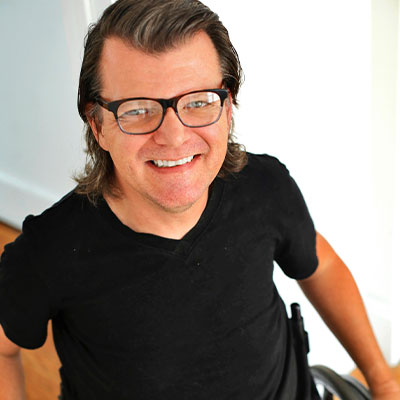We run our website the way we wished the whole internet worked: we provide high quality original content with no ads. We are funded solely by your direct support. Please consider supporting this project.

3 Roots of Discrimination in God’s Church
How Churches Can Serve Differently-Abled People Better
Ministering based on physical observation is the opposite of compassion.
Essay by Todd Lollar
It might surprise you to know that secular areas of society are not the places where I’ve experienced the most discrimination as a minister of the Gospel who is differently-abled. I’ve been hurt by prejudices and discrimination inside God’s holy church far more than I have as an evangelist daily working among lost people.
I experienced many dark years of not being able to get a ministry job due to discriminating views of my speech and body impediment. Even more often, I’ve received hurtful and patronizing remarks about my disability by well-meaning Christians.
After twenty-five years of ministry, I have identified three roots for discrimination against differently-abled people in God’s Church:
1. Insecurity due to one’s own weaknesses.
A common theme that pastors understand is that humans judge others based on deep insecurities or struggles with a similar issue. We all have weaknesses. Typically, these are a source of insecurity.
But weaknesses no longer need to be a reason for insecurity. Instead, they can be a conduit of God’s power.
The Apostle Paul wrote, “I will celebrate my weaknesses, for when I’m weak I sense more deeply the mighty power of Christ living in me” (2 Corinthians 12:9 TPT).
Christians refer to my disability as a disease or something negative due their discomfort with their own weaknesses. When weaknesses remain an insecurity, even in churches people will carry prejudices against others for what they deem as a weakness.
2. Church culture does not allow vulnerability.
Many church leaders are unwilling to share weaknesses from the pulpit. But if we as leaders don’t admit our weaknesses, how are God’s people going to be equipped to be transparent about their weaknesses? When I speak or start to make disciples, whoever I’m with always starts by sharing about their own weaknesses. Why? It’s because I’m open with my own. Some are apparent. Some cannot be seen.
For example, today I shared with someone who I was investing in that I’m weak in the area of finding worth in my career rather than Christ. This person happened to be an actor in Hollywood. He then shared how he struggles with the same thing.
Being transparent with each other, we both got to celebrate how our satisfaction needs to be solely in Christ as the Apostle Paul writes, “and in Him you have been made complete” (Colossians 2:10 NASB).
3. Confusing patronization with compassion.
Many Christians have tried to “minister” to me by saying how tough it would be for them to be in a wheelchair or have a speech impediment. They say this without trying to understand the tough times I’m going through. Perhaps I’m not going through a tough time whatsoever. Or perhaps I’m having a tough time in something that has nothing whatsoever to do with my apparent physical challenge.
For example, maybe I’m feeling lonely. Every person has felt lonely at some time in their life. It’s a feeling that is not linked to any physical challenge.
After a quiet time, Jesus looked out to the crowd and, “When he saw the crowds, he had compassion on them because they were confused and helpless, like sheep without a shepherd” (Matthew 9:36 NLT).
Confusion and helplessness is seen by eyes focused not on the physical state of a person but the heart and soul.
Ministering based on physical observation is the opposite of compassion.
Jesus sets his people free from a wounded identity and into an identity with his own image. Both abled and differently-abled look just like Jesus. God’s Word makes it plain. “And we no longer see each other in our former state—Jew or non-Jew, rich or poor, male or female (may I add abled or differently-abled)—because we’re all one through our union with Jesus Christ with no distinction between us” (Galatians 3:28 TPT). It’s time for the church to see the differently-abled with no distinction. The church is aware of the need to rid ourselves of prejudices for skin-color but we are slow to understand that judging by external appearances also extends to the differently-abled.
Jesus’ Church must be discipled into the reality of the image of Christ and healed of past wounds. As we are identified with Christ and healed of our own wounded spirit, we will see discrimination in God’s Holy Church dissipate.
The first step is to acknowledge our own weaknesses and let them be our greatest strength. Then we will find value in the differently-abled as well, the same value we all possess in Jesus.
Category: Essays, Guest Contributor
Topics: The Church
Guest Contributor:

Todd Lollar describes himself as a slow-moving, slower-talking, speech-impeded, prolonged-achieving, mobilized-in-a-wheelchair, cerebral-palsied minister of the gospel—which makes him an effective speaker who inspires people around the world to follow Jesus passionately.
Todd is also the Hollywood-based executive director of the expanding ministry he founded, Mobilize Ministries. Fueled by his burning passion to minister to people, Todd has traveled across the nation for over two decades speaking the message of God’s Power In Your Weakness and Mobilizing Your Daily Missional Living. God’s power being made perfect in weakness is displayed through Todd’s disability, cerebral palsy. Todd’s Amazon bestselling book, Weak Is The New Strong:God’s Perfect Power In You encourages and equips you to live by God’s power through your weaknesses, not despite them.
